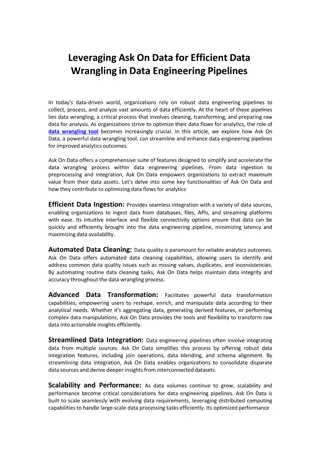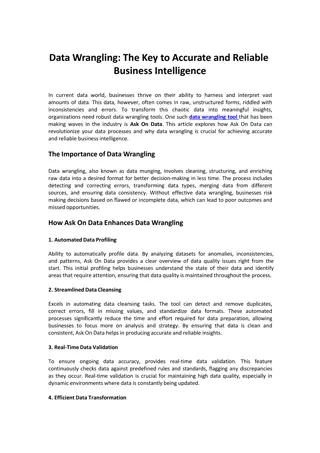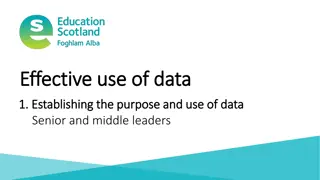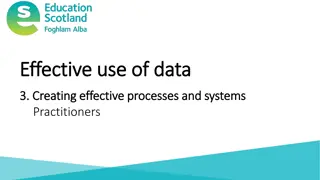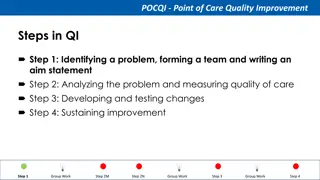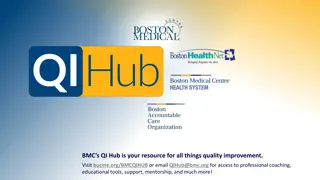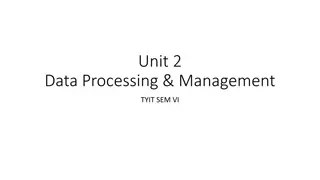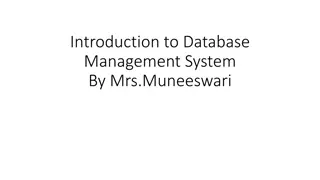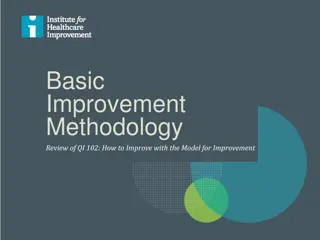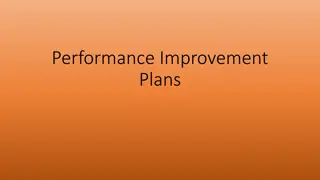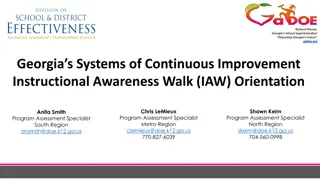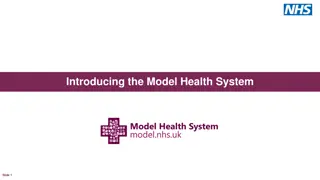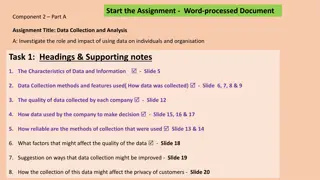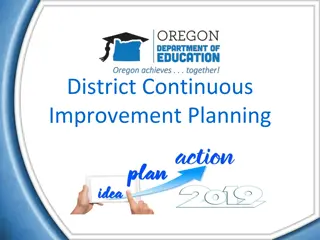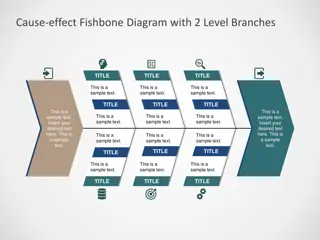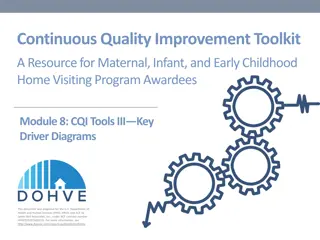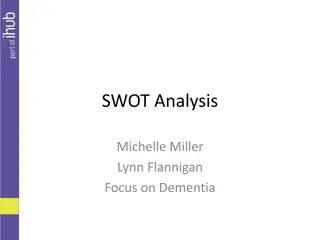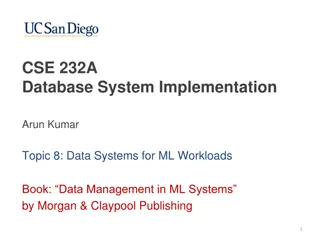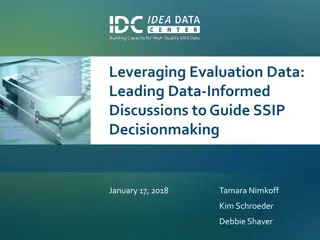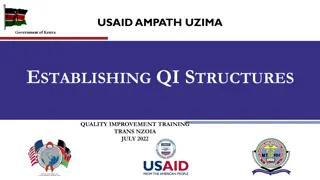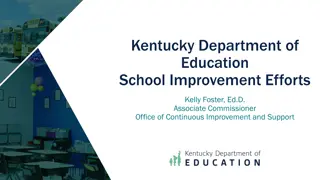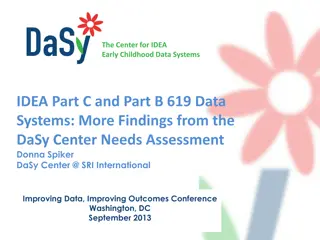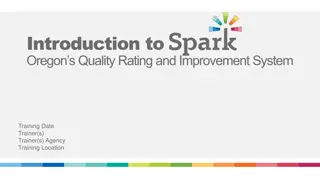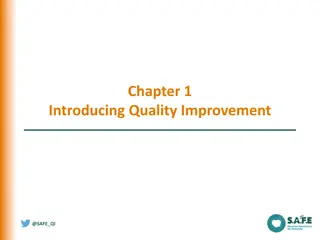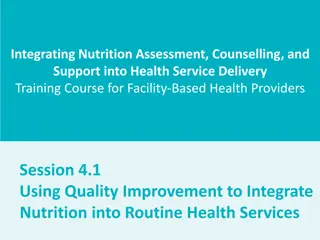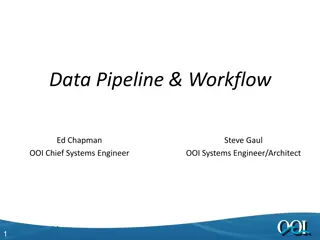Overview of Distributed Systems: Characteristics, Classification, Computation, Communication, and Fault Models
Characterizing Distributed Systems: Multiple autonomous computers with CPUs, memory, storage, and I/O paths, interconnected geographically, shared state, global invariants. Classifying Distributed Systems: Based on synchrony, communication medium, fault models like crash and Byzantine failures. Comp
9 views • 126 slides
NCI Data Collections BARPA & BARRA2 Overview
NCI Data Collections BARPA & BARRA2 serve as critical enablers of big data science and analytics in Australia, offering a vast research collection of climate, weather, earth systems, environmental, satellite, and geophysics data. These collections include around 8PB of regional climate simulations a
6 views • 22 slides
Understanding Information Systems in Organizational Management
Management in organizations is divided into three levels: operational, tactical, and strategic. Each level requires different information systems to support various activities. Operational systems focus on routine transactions and control processes, while middle-level systems aid in semi-structured
9 views • 39 slides
Ask On Data for Efficient Data Wrangling in Data Engineering
In today's data-driven world, organizations rely on robust data engineering pipelines to collect, process, and analyze vast amounts of data efficiently. At the heart of these pipelines lies data wrangling, a critical process that involves cleaning, transforming, and preparing raw data for analysis.
2 views • 2 slides
Data Wrangling like Ask On Data Provides Accurate and Reliable Business Intelligence
In current data world, businesses thrive on their ability to harness and interpret vast amounts of data. This data, however, often comes in raw, unstructured forms, riddled with inconsistencies and errors. To transform this chaotic data into meaningful insights, organizations need robust data wrangl
0 views • 2 slides
Effective Use of Data for Educational Improvement
Explore the significance of data in education, differentiate between quantitative and qualitative data, understand the meaning of evidence, and delve into the role of data in addressing equity issues. The workshop covers various topics such as data definitions, the use of data for improvement, natio
0 views • 26 slides
Effective Data Processes and Systems Workshop Overview
The workshop covers the importance of effective data processes and systems, defining data processes, scenarios, reflection, feedback, and more based on national guidance and research. Participants learn to ensure accuracy, update data regularly, and integrate data cycles into improvement cycles for
0 views • 26 slides
Point of Care Quality Improvement (POCQI) Steps in Quality Improvement
POCQI involves four key steps: identifying a problem, analyzing the problem, developing and testing changes, and sustaining improvement. It emphasizes reviewing data, prioritizing problems, forming effective teams, and writing clear aim statements. Teamwork is crucial for healthcare improvement as i
0 views • 62 slides
BMC's QI Hub: Your Quality Improvement Resource
BMC's QI Hub offers professional coaching, educational tools, support, mentorship, and more for quality improvement. Learn about run charts, understanding variation, tracking data over time, and distinguishing between common cause and special cause variation. Discover how run charts help assess inte
0 views • 38 slides
Evolution of Data Processing Systems in Geographic Information Science
Data processing systems in Geographic Information Science have evolved from manual, analogue methods to advanced software and hardware components. The incorporation of Geographic Information Systems (GIS) has revolutionized the handling and analysis of geo-referenced data, making tasks like data cap
0 views • 20 slides
Introduction to Database Management System Explained
This presentation covers the basics of database management systems, including definitions of data, types of data, structured and unstructured data, storing data in computers using file systems and database systems, and issues with file systems like data redundancy, inconsistency, difficult data acce
1 views • 18 slides
Understanding Different Types of Recommender Systems
Recommender systems play a crucial role in providing personalized recommendations to users. This article delves into various types of recommender systems including Collaborative Filtering, Content-Based, Knowledge-Based, and Group Recommender Systems. Collaborative Filtering involves making predicti
0 views • 7 slides
Improving Quality with the Model for Improvement
In this content, we delve into the Model for Improvement methodology, focusing on key aspects such as setting aims, choosing measures, developing and testing changes. It discusses the three questions in the Model, elements of an effective aim statement, types of measures, and utilizing change concep
1 views • 27 slides
Introduction to Embedded Systems Design
Embedded Systems Design, Chapter 1 provides an insightful overview of embedded systems, distinguishing them from general-purpose computers. The chapter delves into the characteristics of embedded systems, their design considerations, and the various types of embedded computers such as general-purpos
1 views • 7 slides
Collaborative Achievement in Quality Improvement at NHS Highland
Joan-Marie Sutherland, a Quality Improvement Practitioner at NHS Highland, shares their achievements, success factors, challenges overcome, and strategies for improving Acute Kidney Injury care. Key elements include dedicated QI support, staff engagement, project prioritization, building relationshi
0 views • 11 slides
Understanding Data Governance and Data Analytics in Information Management
Data Governance and Data Analytics play crucial roles in transforming data into knowledge and insights for generating positive impacts on various operational systems. They help bring together disparate datasets to glean valuable insights and wisdom to drive informed decision-making. Managing data ma
0 views • 8 slides
Utility Performance Improvement Strategies
Effective utility performance improvement involves benchmarking, selecting key performance indicators (KPIs) aligned with strategy, developing improvement plans, and implementing initiatives to achieve targets. This process entails identifying focus areas, setting improvement targets, and implementi
0 views • 37 slides
Comprehensive Overview of Georgia's School Improvement Systems
Richard Woods, Georgia's School Superintendent, leads the initiative to enhance Georgia's education system through the Systems of Continuous Improvement. The Instructional Awareness Walk (IAW) program offers support to schools in establishing effective instruction and a conducive learning environmen
0 views • 17 slides
Enhancing Healthcare Systems Through Data-Driven Improvement
The Model Health System offers data-driven insights to enhance patient outcomes and population health by identifying opportunities for improvement across care quality, productivity, and organizational culture. Through benchmarking and clinical improvement data, it supports systems in achieving bette
0 views • 15 slides
ARHOME: Arkansas Health & Opportunity for Me Demonstration Project
The ARHOME project in Arkansas aims to improve health outcomes and economic independence by transitioning Medicaid recipients to private insurance while maintaining eligibility and federal funding. With measurable goals focused on health improvement and poverty reduction, ARHOME seeks to drive quali
0 views • 16 slides
Understanding Data Collection and Analysis for Businesses
Explore the impact and role of data utilization in organizations through the investigation of data collection methods, data quality, decision-making processes, reliability of collection methods, factors affecting data quality, and privacy considerations. Two scenarios are presented: data collection
1 views • 24 slides
Oregon District Continuous Improvement Planning Process
Explore the key components of Oregon's district continuous improvement planning process, including objectives, executive memos, ODE commitments, and the essential elements that all Oregon districts must incorporate into their continuous improvement plans. Learn about the shifts in the overarching vi
0 views • 9 slides
Various Quality Improvement Diagrams for Root Cause Analysis
Explore a series of quality improvement diagrams such as fishbone diagrams, cause-and-effect flow charts, error reduction improvement diagrams, and root cause analysis steps. These visual tools offer insights into identifying and addressing root causes of issues in different processes or systems.
0 views • 12 slides
Key Driver Diagrams in Continuous Quality Improvement
Key Driver Diagrams are essential tools in Continuous Quality Improvement (CQI) to help organizations achieve their goals by identifying key drivers and their relationships. These diagrams aid in understanding complex systems, setting SMART aims, and implementing effective change strategies. Through
0 views • 24 slides
Quality Improvement Strategies for Dementia Care Enhancement
Explore the importance of improvement initiatives in dementia care through SWOT analysis, experience sharing, and fundamental concepts. Discover why adaptability is key to survival and how quality improvement differs from research and performance. Learn about executing QI ideas, the Model for Improv
0 views • 23 slides
Information Systems in Organizations: Overview and Implementation
Information systems play a crucial role in organizations, encompassing transaction processing systems, functional area information systems, and enterprise resource planning systems. This content delves into the purpose of transaction processing systems, the support provided by information systems ac
0 views • 30 slides
Enhancing Quality Improvement in Health and Social Care
Explore how to support innovation and improvement at all levels within the Health and Social Care sector through the Quality Attributes Framework (QAF). Discover eLearning programs, face-to-face courses, and consultancy services aligned with the framework to drive quality improvement. Put people fir
0 views • 22 slides
Data Systems for Machine Learning Workloads and Advanced Analytics
This content explores the intersection of database systems with machine learning workloads, covering topics such as big data systems, ML lifecycle tasks, popular forms of ML, and data management concerns in ML systems. It delves into the importance of ML systems for mathematically advanced data anal
0 views • 21 slides
Leveraging Evaluation Data for Data-Informed Decision-Making
Participants will enhance their understanding of the value of data discussions for assessing progress and guiding decision-making in the State Systemic Improvement Plan (SSIP). The session will cover leveraging data for decision-making, utilizing the IDC Data Meeting Protocol, and examples of protoc
0 views • 25 slides
Establishing Quality Improvement Structures in Healthcare Settings
Learn about the importance of Quality Improvement Teams (QITs) and Work Improvement Teams (WITs) in healthcare facilities, their formation processes, roles, and responsibilities. Discover how QITs and WITs contribute to enhancing decision-making, commitment to quality improvement, and overall health
0 views • 35 slides
Kentucky Department of Education School Improvement Efforts
The Kentucky Department of Education focuses on school improvement efforts through Comprehensive Support and Improvement (CSI), Targeted Support and Improvement (TSI), and Additional Targeted Support and Improvement (ATSI) programs. Schools undergo a statutory and regulatory process as per state law
0 views • 7 slides
Improvement and Assurance Framework for Local Government - November 2023
Local authorities play a crucial role in their own performance and improvement, guided by the sector-led improvement approach. This framework emphasizes accountability, transparency, and continuous improvement, supported by tools and resources provided by the LGA. Assurance and accountability mechan
0 views • 18 slides
Early Childhood Data Systems Governance and Data Quality Assessment
This content highlights the importance of data governance in early childhood data systems, focusing on Part C and Part B 619 data systems. It discusses the findings from the DaSy Center needs assessment, covering topics such as data governance, data quality, and procedures for ensuring accurate and
0 views • 23 slides
Missouri School Improvement Program: Development Update
The Missouri School Improvement Program (MSIP) focuses on improvement drivers, policy goals, development teams, timeline, emergent themes, performance standards, and process standards to enhance the academic achievement, readiness of graduates, and overall educational experience in schools and distr
0 views • 43 slides
Understanding Embedded Systems and Cyber-Physical Systems
Embedded systems are specialized computer systems embedded within larger systems, such as control systems and car controllers. This lecture covers real-time aspects, applications of Cyber-Physical Systems (CPS), and examples like the Boeing 777/Airbus A380 cockpit. It discusses the design process of
0 views • 22 slides
Home Improvement Market Trends & Forecasts 2023
The once booming home improvement market is projected to decline in 2023 due to inflation, higher prices, and job market softening. Insights from 2022 show a surge in home improvement projects among new homebuyers. The impact of the housing market on home improvement spending is significant, while r
0 views • 10 slides
Understanding Oregon's Quality Rating and Improvement System (QRIS) Training Overview
This training provides an in-depth look at Oregon's Quality Rating and Improvement System (QRIS), covering topics such as the Quality Improvement Plan, participation in Spark, program supports and incentives, portfolio submission, Spark partners, and more. Gain valuable knowledge and tools to enhanc
0 views • 45 slides
Quality Improvement Methods and Domains for Better Healthcare Outcomes
This content introduces Quality Improvement (QI) processes, methods, and domains essential for enhancing healthcare outcomes. It covers the significance of continuous efforts by healthcare professionals, patients, researchers, and other stakeholders to improve patient outcomes, system performance, a
0 views • 16 slides
Integrating Nutrition Assessment and Counseling: Quality Improvement in Health Services
This training course focuses on integrating nutrition assessment, counseling, and support into routine health services using quality improvement methods. Participants will learn to explain the concept of quality improvement, develop a plan for integrating nutrition services, and understand key princ
0 views • 32 slides
Data Pipeline and Workflow Overview for OOI Systems Engineering
This comprehensive overview delves into the data pipeline, workflow, and system architecture for OOI Systems Engineering, led by Ed Chapman and Steve Gaul. Key topics include sensing, data ingest, data versioning, data schema/storage, and data product delivery. The document provides insights into th
0 views • 35 slides



